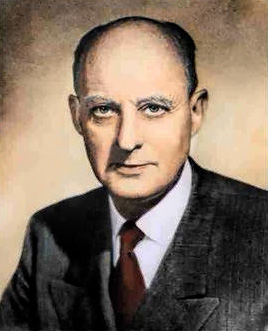A superb lecture by Andrew Bacevich of Boston University (author of The New American Militarism: How Americans are Seduced by War and The Limits of Power: The End of American Exceptionalism) on the enduring importance of Reinhold Niebuhr on American political thought.
Niebuhr was very influential on Lyndon B. Johnson and many members of his administration when they were designing the Great Society, even as Niebuhr became a vocal critic of the Vietnam War. He attacked the materialism, complacency and conformity that he saw permeating post-war America in the 1950s and 1960s. The root of sin, he reminded Christians, was self-love, and the selfishness that goes along with it, both as individuals and as societies.
Niebuhr was a complex man, and, as Bacevich notes, he defies easy categorization. He offered a critique of religious liberals over what he called their naive views of sin and the optimism of the Social Gospel. At the same time, he rebuked religious conservatives for what he saw as their naive view of the Bible and their narrow definition of "true religion."
In our era of rampant and conspicous consumerism, increasing American exceptionalism (to an almost messianic level), American military adventurism in foreign affairs, and our love of self (one can only imagine what Niebuhr would have thought of "reality TV", and our growing obsession with "fame"), Niebuhr's work is more relevant than ever - a point that Professor Bacevich makes with both clarity and passion in this thought-provoking lecture.
Paul Kimball
In our era of rampant and conspicous consumerism, increasing American exceptionalism (to an almost messianic level), American military adventurism in foreign affairs, and our love of self (one can only imagine what Niebuhr would have thought of "reality TV", and our growing obsession with "fame"), Niebuhr's work is more relevant than ever - a point that Professor Bacevich makes with both clarity and passion in this thought-provoking lecture.
Paul Kimball

No comments:
Post a Comment